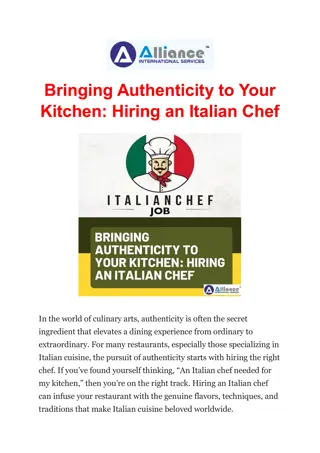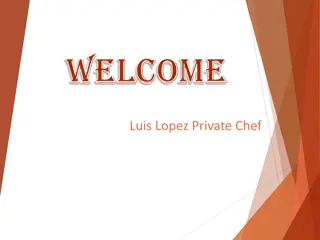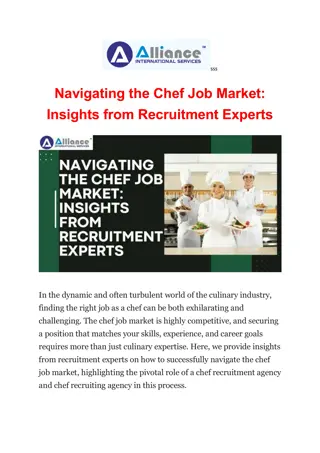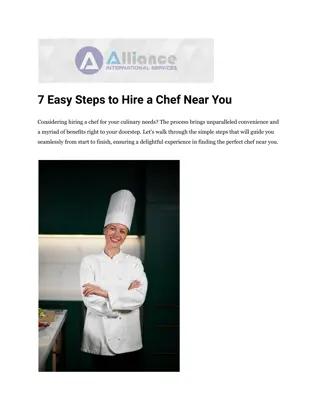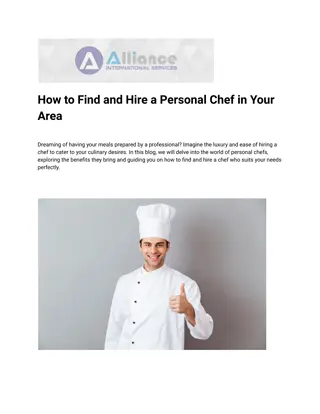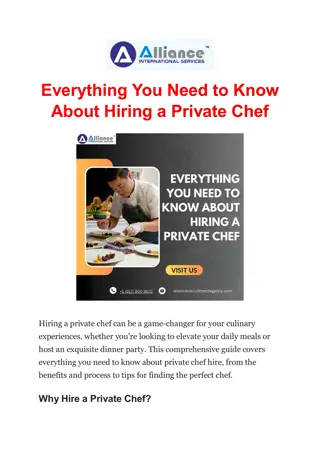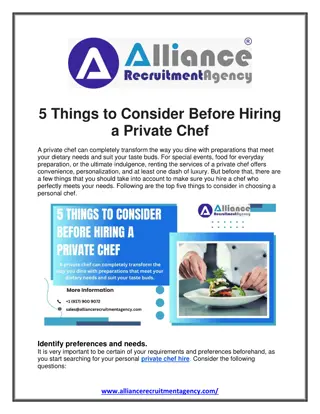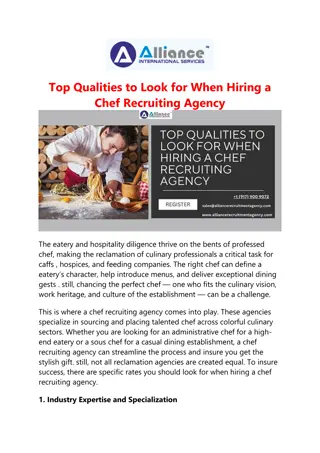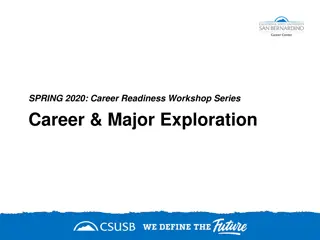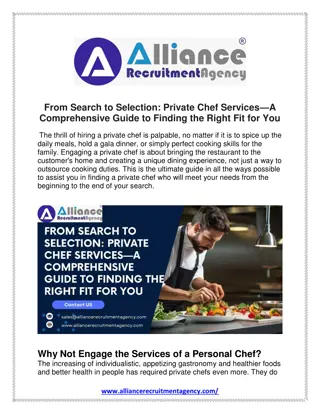Career Path to Becoming a Chef
Exploring the culinary world as a chef entails various responsibilities, from preparing and presenting food creatively to managing kitchen operations efficiently. This journey involves understanding the role, key information, typical earnings, and career progression opportunities. Discover the routes available, such as college courses and apprenticeships, to embark on a rewarding career in the culinary arts.
Download Presentation

Please find below an Image/Link to download the presentation.
The content on the website is provided AS IS for your information and personal use only. It may not be sold, licensed, or shared on other websites without obtaining consent from the author.If you encounter any issues during the download, it is possible that the publisher has removed the file from their server.
You are allowed to download the files provided on this website for personal or commercial use, subject to the condition that they are used lawfully. All files are the property of their respective owners.
The content on the website is provided AS IS for your information and personal use only. It may not be sold, licensed, or shared on other websites without obtaining consent from the author.
E N D
Presentation Transcript
By the end of this session, learners will understand: What the role involves Key information about the role What routes are available to you What are your next steps 1 <Title of presentation>
Key info Key info Entry level 17,000 Experienced 50,000 Typical hours: 40 - 45 per week Working pattern: You may work evenings, weekends and bank holidays
What does a Chef do? What does a Chef do? Chefs prepare, cook and present food in hotels, bars and restaurants On a daily basis you might: prepare attractive menus to nutritional standards control and order stock and inspect it on delivery prepare meat and fish for cooking scrape and wash large quantities of vegetables and salads cook and present food creatively monitor production to maintain quality and consistent portion sizes work under pressure to make sure food is served on time keep to hygiene, health and safety and licensing rules
Career progression Career progression With experience, you could progress to section chef (station chef) and look after a particular area like desserts. The next step is sous chef, running an entire kitchen when the head chef is busy. As head chef (also known as chef de cuisine), you'll run a kitchen, create menus and manage the budget. Very large establishments have executive chefs, usually in charge of multiple outlets. This is a management role and you would do very little cooking.
What routes you can take to be a Chef? What routes you can take to be a Chef? College One way into the job is to take a college course. These include qualifications like: Level 3 Diploma in Professional Cookery T Level in Catering Level 4 Diploma in Professional Culinary Arts Entry requirements You'll usually need: 4 or 5 GCSEs at grades 9 to 4 (A* to C), or equivalent, for a level 3 course 4 or 5 GCSEs at grades 9 to 4 (A* to C), or equivalent, including English and maths for a T level 1 or 2 A levels, a level 3 diploma or relevant experience for a level 4 or level 5 course Apprenticeships The following apprenticeships are relevant to this role: production or commis chef intermediate apprenticeships senior production chef or a chef de partie advanced apprenticeship You can also train to be a chef through an apprenticeship in the armed forces.
English Maths Biology What What subjects subjects could I could I Chemistry Physics Geography What subjects do I need to enter this sector? focus on? focus on? Foreign languages Art and design Design and Technology Physical education Computing History
Our role models Our role models Our role models are inspirational individuals who have achieved career success in their chosen field through Apprenticeship and Technical Education pathways. They represent the impact that such a chosen pathway can have to future generations. Their wealth of experience in their field is combined with an exciting and inspirational career journey that has successfully utilised the skills learnt through our competition skills development programme. On the next slide you will get the chance to hear from one of them.
Conversations with a Chef Conversations with a Chef Name: Eden Occupation: Chef Education: College Location: South West
Discussion Discussion Is this a sector you would consider entering? What do you see as the positives for this career pathway? What do you see as the negatives?
Next steps Find an Apprenticeship: https://www.findapprenticeship.service.gov.uk/apprenticeshipse arch Find a course: https://nationalcareers.service.gov.uk/find-a-course/search Not sure what role would be right for you? INSERT Conversations with link here
Thank you Any questions?







